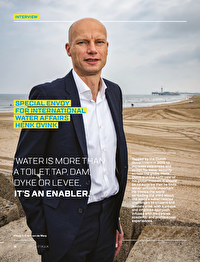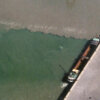What is your current role and what is your focus?
I am a Water Envoy. An envoy is an ambassador dedicated to a specific topic, and for me that is water. There are water-related challenges everywhere such as climate, health, security and so forth. I have been in this role now for five years. I was asked to become the Water Envoy by the prior cabinet and the Ministers Schultz van Haegen, Ploumen, and Kamp from the Ministries of Infrastructure and Environment Development Cooperation and Economic Affairs. They said ‘water is so critically important across the world and is connected to a lot of the challenges and opportunities that we face. We need a 24/7 representative of the Dutch cabinet to work around the world on water awareness and action’.
First, there is a need for better understanding and awareness. This can be done through research, capacity building, education and in partnerships, leading to political and societal awareness as well as awareness and understanding in the financial sector. With understanding and awareness comes partnerships, strong coalitions and collaborations for action because the second need is about action: helping the world to move beyond response and towards preparedness.
There are so many water-related disasters across the world, 90% of all natural disasters are water-related! I believe that we need to limit these disasters – both the strength, the amount and their impact - with strong climate action and sustainable development. Nevertheless, disasters happen, so we better be prepared by building resiliency in our communities and environments. Post-disaster response demands that future orientation, in partnership, not responding to the past disaster, and only repairing, but preparing for the future and building back better. Can we move the world from a response mode to a preparedness mode? Can we have those two in place – increased awareness and understanding – plus being prepared? What are then the opportunities to help leapfrog? In the context of a changing climate and the need for sustainable action in line with the Sustainable Development Goals (SDGs), we need scale and replication, and at a different speed and extent than we see now. What kind of innovative practices do we need?
What led you to working within the water sector?
I think water is critically important and interestingly complex. If we invest in water, the benefits are usually outside the water world. With clean drinking water available, health costs go down, gender opportunities go up, equality goes up and education opportunities go up. With 24/7 guaranteed water with the right quality, conflict opportunities go down and food security goes up. If we mitigate climate risks by investing in water, risks go down and revenues go up. And so forth.
We have to make people aware that if you invest in water, there is a trickle-down effect outside of the water world, in their world. That demands collaboration. Water incentivises a collaborative approach, integrating needs and opportunities, and creating common values and benefits. Only through inclusive collaboration can we make that happen.
The goal is to go from a systems understanding all the way to sustainable investments in projects which means that parallel to investing in the project, you have to invest in the people and the process. I sometimes say you need a million to spend a billion wisely. You need to invest in understanding, awareness, capacity, the enabling environment and so forth, to be able to get to those solutions that are transformational, have sustainable impact, and help to build societies holistically. For that, we need better business cases including people, the environment and all values of our economies and societies.


















